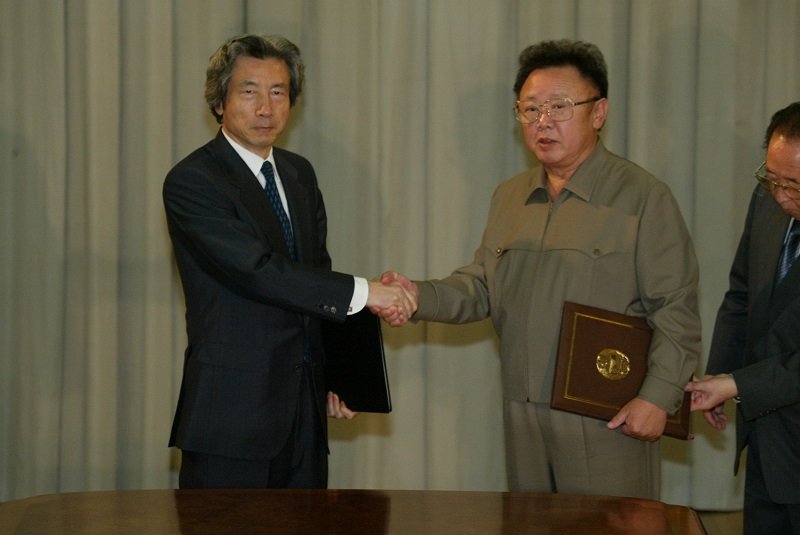20 years after Japan-North Korea declaration, no progress made on bilateral negotiations

Then Prime Minister Junichiro Koizumi shakes hand with then North Korean leader Kim Jong Il after signing the Japan-North Korea Pyongyang Declaration in Pyongyang on Sept. 17, 2002.
6:00 JST, September 18, 2022
Saturday marked 20 years since then Prime Minister Junichiro Koizumi signed the Japan-North Korea Pyongyang Declaration on Sept. 17, 2002, during his visit to North Korea.
The Japanese government maintains its stance of resolving the issue of abductions of Japanese citizens by North Korea together with North Korea’s nuclear and missile development issues, based on the declaration.
The government intends to make all-out diplomatic efforts to break the impasse, but North Korea has closed the door to dialogue, and the situation is becoming more difficult to resolve year after year.
No results
“Based on the Japan-North Korea Pyongyang Declaration, Japan has been consistently seeking a comprehensive solution to the abduction, nuclear and missile issues as well as aiming at normalizing diplomatic relations by settling the unfortunate past,” Foreign Minister Yoshimasa Hayashi emphasized on Friday. “There has been no change in the policy.”
The Japanese government’s diplomacy with North Korea is based on the declaration, which was signed by Koizumi and then North Korean leader Kim Jong Il during Koizumi’s visit to the country in September 2002.
After the first Japan-North Korea summit meeting, five of the abductees were returned to Japan in October 2002. The families of the five abductees also arrived in Japan in 2004 in connection with Koizumi’s second visit to North Korea in May 2004.
But since then, no concrete results have been achieved.
The last official exchange between the Japanese and North Korean governments was in September 2018, when then Foreign Minister Taro Kono met with North Korean Foreign Minister Ri Yong Ho in New York.
In the past two decades, North Korea has made progress in its nuclear and missile development. During the Kim Jong Il era, North Korea fired ballistic and other missiles 16 times and carried out nuclear tests twice. But under the Kim Jong Un regime, Pyongyang launched a total of 122 missiles and conducted nuclear tests four times from 2012 to now.
Russia threatened to use nuclear weapons in its invasion of Ukraine. North Korea is more confident in the effectiveness of its nuclear weapons and has increasingly taken a hard-line stance.
Risks
Under such circumstances, it has been difficult to find a way to draw North Korea into dialogue. Some U.S. experts have suggested that North Korea should be recognized as a de facto nuclear weapons state and arms control negotiations should be started.
Eiji Yamamoto, a former Foreign Ministry official who was involved in diplomacy with North Korea for many years and published a memoir on North Korean diplomacy in March, told The Yomiuri Shimbun: “Now is the time for a change in strategy, such as offering assistance in fighting COVID-19. If we don’t take risks and make a move, the situation will be the same 10 years from now.”
However, a senior Foreign Ministry official involved in Japan-North Korea affairs is negative on changing Tokyo’s stance. “If we change our policy and soften our stance, North Korea may perceive that we have shown weakness and further escalate the situation.”



